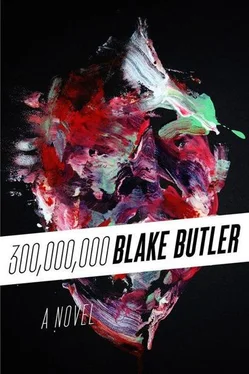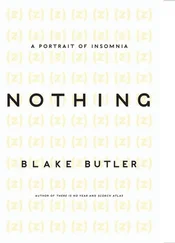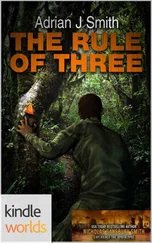Flood lets his head nod toward the floor; down there in the mirror set beneath him Flood is smiling at himself in vast attraction, his gum meat popping in his head, gored bridges, a long white.
Flood stops, stands, stares, hears nothing. He jumps up in the air above the image of his face beneath him, splitting different, changing angles; the air is empty; a music begins to play, swelling low and hot out of his pore holes into the sound of air making no sound.
In the air above his face, as he is lifted, Flood invokes the moment he’s only just now invented, in remembrance of a moment in a place he can return to in the future, however ruined. From up here, semi-paused and still inside him, on the floor below he sees himself there rerendered just above. Across from him, in the cubic air underneath the Black House where the pulp of the murdered bodies and all their blood and rip had been, Flood sees himself peripherally seeing himself beneath him as he sees himself from above. Behind him, he hears more; he does not look to verify that these are him behind him and so they are not, and the mirror echoes with the lie: he appears alone here but he is not alone here and does not look beyond himself.
He does not think the prior thought at all inside him, and in not thinking realizes he is not the one doing this, not the engine, but this doesn’t stop him from not doing regardless, held as he is inside his own eyes and learning at last now to see what about the glint of his eyes shows someone else just there within him also, surrounded from outside and within. The moment grows.
There is a hell.
Here I am above me seeing me above me and below and beside me all at once, Flood says aloud. The words come out spoken in one word altogether, a name he’s never heard before or thought before: Darrel. The word adheres hot to his cheekface and the gristle in his neck where words are born. The words inscribe themselves along the mirror, written white in breathy lesions of the glass that will not be erased.
I am Darrel, he says aloud again, and again the words at once come out as one, the flick of the tongue to palate and the posture of his creaking growing in him in the language breaking through his lungs. So he is Darrel.
In the room under the Black House, Darrel (Flood) begins to land. He will destroy himself, he hears him saying in his second voice in third person in one word, in a voice that seems by the moment turning back upon itself as it is passed, a voice without sound but of sound, like sound deleted, a nothing flowing, wanting more. He will save his other life by giving it away; wedded in the instant to the coursing of the blood within him he would have liked to deliver into her, into a child made of his wife and him together only; a second self who could have lived beyond the minute of this exit, carried on all the sets of sets of expectations and hopes and troubles beyond the rind of Flood’s own body here and now split and coiling fast and hard around the moment so fast that he already can’t remember how it happened, how it is happening, causing the moment as it happened to stand alone unto itself unframed; therefore the moment cannot die, causing between the real and unreal a rip from one world to another, splitting Flood, the human, the nonfather, all apart, each instance of each of him and us eternally on pause from there forward in time to many false dimensions of him, each one aging as he goes. This had been happening his whole life, through every instance, and with everyone, and only now does he recognize how little of him here is left, leaving the space for whatever else could want to come into him as he is now to come and come and have him.
Poised in the falling air, Flood (Darrel) sees Darrel (Flood) beneath him coming closer as he approaches also unto the mirror with the copies of him surrounding (and all those others, whoever ever) seeing too, and through the mirrored walls the bloat of pressure of the missing moments seeing too, being too so gross and endless that in each there is no key, the ocean of the moment swollen hard every instant lived inside itself to rise above it and be crumpled as it passes into night, the mirrors in the house and beyond the house unbound ongoing moaning soft inside him, singing the death song.
SMITH: Both as a matter of official preservation, and for his own good, I have placed Flood on leave for a period as yet to be determined; throughout he will receive full benefits and pay as long as he cooperates, though I have as yet been unable to get ahold of him by any method for the last thirty-something hours, which I am afraid, if continued, could require greater consequences .
FLOOD: I am only just now beginning to understand what I could never understand. Something beyond me. Something beyond something beyond the all of us all inside us and around us and inside. I could and will and cannot slow down now .
Where Darrel (Flood) lands upon Flood (Darrel), ramming, through the glass of the ground’s mirror, the mirror ruptures, splits apart. The floor is false. Underneath the floor is a second floor, forming a cavity beneath the room, which the mirrors had kept hidden from investigation.
The room is roughly six feet deep, high enough to hide a body propped up erect, though there are no new bodies down here. The texture of the face of the surface is marbled pink with loam of discolored pigments set into it like speckled ham. It is soft and seems to be made of a synthetic polymer, like something from spacecraft. There is no smell; the air of the room above seems not to permeate beyond itself.
Flood’s flesh having fallen sits under the shards of black glass knocked unconscious for some duration before he returns back into his head. A large raised divot above his right ear throbs a heating music. There is blood exiting from a slight slash on his chest, and from another wetting through his pants’ knee. He pukes, woozy, upon waking. It takes a second and third seeing from inside him to realize again where he is: inside an alcove that had previously remained hidden beneath the layered mirrors of the floor in the locked room: a false floor, the key through which had been his own weight, i.e. himself.
Any wall could have another room behind it, Flood says aloud to no one.
All the edges of the world.
There is also blood on Flood’s hands; he goes to rub it on his shirt and makes twin handprints in impression; he rubs the remainder on the wall, though there is still blood on the hands even after having wiped them clean enough they seem mostly clean. He stops and forgets about the color, looking up into the mirror of the ceiling of the room above from where he’s fallen in, seeming higher than it should be. The room is too dark to make out his reflection in the mirror lining, layered up there now, seeing him seeing what he sees.
The linings of the exposed alcove have a glow, Flood realizes, eyes adjusting. The curvature of the space of the small revealment is affixed with low fluorescent light, panels of the surface there itself, backlit at low grade, almost low enough to not notice. In the cud of it Flood is yellowish, elderly-like. He smears a little blood on skin on himself, touching himself to see if he can feel it.
He shifts to stand. Erect, his head rises well enough over the lip of the indention that he can see around the room from down below, nearer to the reflective lining of the first floor’s flat expanse that makes the space seem both ever endless and, in knowing of the false nature of the surface, that much less. Mirrors speaking back and forth into one another, prismatic closets, which in the instance of this particular chamber and the past it held as present even just weeks before seeming somehow thicker in its air, black diamonds, phantom death. Traces of old blood and other matter’s smudging on the mirror reflect Flood’s head back at his central head appearing tattooed or blotted out in bits of obfuscation, showing nothing of him back to him the way to others he’d seem seen.
Читать дальше












